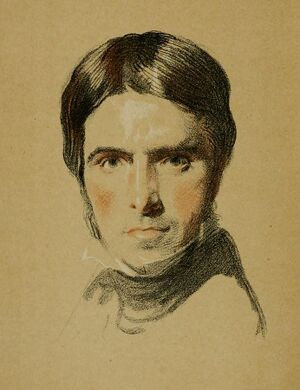Thomas Carlyle (nonfiction): Difference between revisions
No edit summary |
No edit summary |
||
| (One intermediate revision by the same user not shown) | |||
| Line 18: | Line 18: | ||
== Nonfiction cross-reference == | == Nonfiction cross-reference == | ||
* [[French Revolution (nonfiction)]] | |||
* [[Writer (nonfiction)]] | * [[Writer (nonfiction)]] | ||
| Line 25: | Line 26: | ||
[[Category:Nonfiction (nonfiction)]] | [[Category:Nonfiction (nonfiction)]] | ||
[[Category:People (nonfiction)]] | |||
[[Category:Writers (nonfiction)]] | |||
Latest revision as of 12:57, 27 November 2016
Thomas Carlyle (4 December 1795 – 5 February 1881) was a Scottish philosopher, satirical writer, essayist, historian, and teacher.
Considered one of the most important social commentators of his time, he presented many lectures during his lifetime with certain acclaim in the Victorian era. One of those conferences resulted in his famous work On Heroes, Hero-Worship, and The Heroic in History where he explains that the key role in history lies in the actions of the "Great Man", claiming that "History is nothing but the biography of the Great Man".
A respected historian, his 1837 book The French Revolution: A History was the inspiration for Dickens' 1859 novel A Tale of Two Cities, and remains popular today.
Carlyle's 1836 Sartor Resartus is a notable philosophical novel.
A great polemicist, Carlyle coined the term "the dismal science" for economics.
In the News
Fiction cross-reference
Nonfiction cross-reference
External links:
- Thomas Carlyle @ Wikipedia
